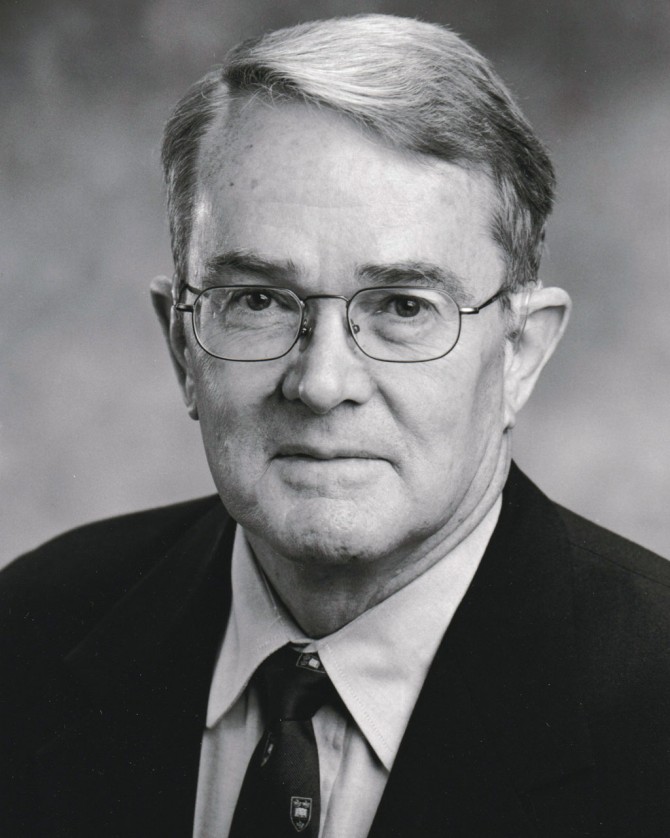William B. Streett, former engineering dean, dies at 92
By Syl Kacapyr
William B. Streett, who was recognized for changing the culture of undergraduate studies as dean of Cornell Engineering, died Feb. 5 in Cincinnati. He was 92.
Streett, a professor of chemical engineering whose groundbreaking experimental research helped quantify liquid-vapor equilibrium in gases, joined Cornell in 1981 and was named the Joseph Silbert Dean of Engineering in 1985. As dean, he worked to improve undergraduate education as well as the representation of women and other underrepresented groups.
“Bill stressed the need for the college to increase emphasis on the quality of the undergraduate experience while still pursuing excellence in graduate education and research,” said Michael Shuler, professor emeritus of biomedical engineering. “While this trend to better balance undergraduate education with research and graduate education became widespread, Bill’s vision was among the first of engineering deans at leading research universities.”
Streett, who was born in Lake Village, Arkansas, was a 1955 graduate of the U.S. Military Academy at West Point and served as a commissioned officer in the Army for 23 years, rising to the rank of colonel. He received his doctorate in mechanical engineering in 1963 from the University of Michigan, where his thesis research was a NASA-sponsored project to measure the solubility of helium gas in liquid hydrogen for the purpose of developing rocket fuel.
A NATO Postdoctoral Fellowship enabled him to spend a year at Oxford University before returning as a faculty member to West Point, where he became the first assistant dean for research and founded the Science Research Laboratory. With the help of a Guggenheim Foundation Fellowship, he returned to Oxford in 1974, where he developed groundbreaking computer simulations of liquids at the molecular level.
In 1978, he retired from the Army and joined what was then Cornell’s School of Chemical Engineering as a senior research associate, before earning a tenured appointment as professor of chemical engineering in 1981. In 1984, Streett was appointed half-time to serve as associate dean for research and graduate studies for Cornell Engineering; in 1985 he was appointed dean, a position he would hold for nine years.
As dean, Streett worked to improve undergraduate education by broadening curriculum beyond technical subjects, stressing the need for graduates to bring to the workforce people skills, communication skills and creativity. He instituted a program in oral and written communication for engineers and encouraged students to take more electives in the humanities and other non-engineering subjects.
Coming from West Point, Streett understood the military origins of engineering education in the U.S. and recognized the need for change. A Cornell Engineering Magazine published during his time as dean, called “Pumps Not Filters,” captures how he worked to change the undergraduate student experience to one that supported and encouraged students. As a result, student retention rates increased dramatically.
Streett also prioritized recruiting women and other underrepresented groups to the college, and established programs to help them succeed. By the end of his term as dean, the college reported an average enrollment of 25% women – the national average in 1994 was 17% – and had brought the number of tenured women faculty members from one to 14. For his efforts, Streett was honored with the Rodney D. Chipp Memorial Award from the Society of Women Engineers.
Streett was also known for his commitment to faculty members, and campaigned to get 19 of them elected to the National Academy of Engineering during his tenure as dean.
Another priority for Streett was upgrading Cornell Engineering’s facilities. He oversaw a two-story addition to Upson Hall that gave more space to the Department of Computer Science, and in 1990 he opened what is now Rhodes Hall. The building housed much-needed space for electrical and computer engineering, among other disciplines, and became the new home for Cornell’s Theory Center – now the Center for Advanced Computing – bringing one of the nation’s most powerful supercomputers from Caldwell Hall to the Engineering Quad.
Streett retired from Cornell in 1995, subsequently co-founding and serving until 2010 as president of a company to promote a technology developed at Cornell. He also continued to mentor students.
“Dean Streett was a steadfast and thoughtful mentor to me and to countless other students over the decades,” said John Ochsendorf ’96, professor of engineering and architecture at the Massachusetts Institute of Technology and a MacArthur Fellow. “He served as a constant adviser from my graduation to today, teaching me how to be an inquisitive and humanistic engineering professor. Bill was the very model of a scholar and I will continue to pay forward his many lessons.”
Streett is survived by his wife, Mary Sansalone, Ph.D. ’86, a former Cornell Engineering professor; his children Robert, David, Kathleen, MBA ’87, and Michael ’84; seven grandchildren and four great-grandchildren.
Syl Kacapyr is associate director of marketing and communications for Cornell Engineering.
Media Contact
Get Cornell news delivered right to your inbox.
Subscribe

